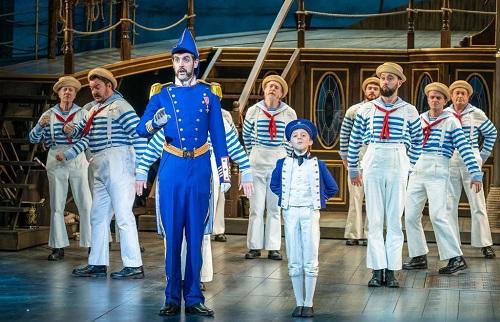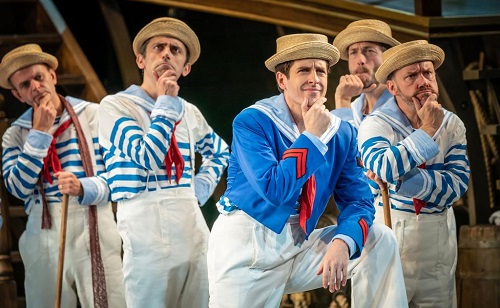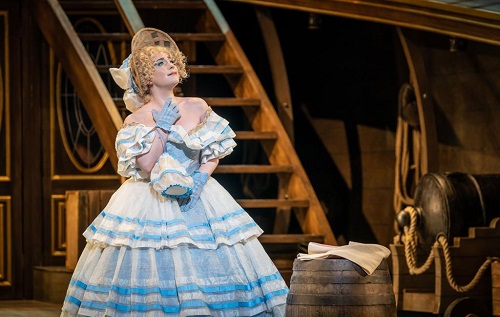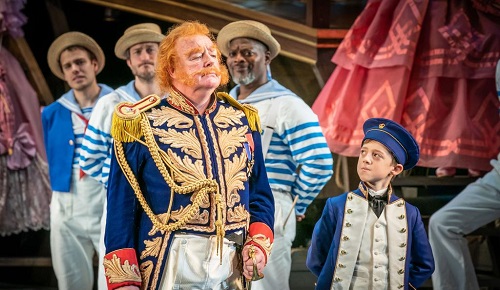The Modern Major-General may dismiss its whistled airs as “infernal nonsense”, but the songs of HMS Pinafore have lost none of their appeal during the near 150 years since Gilbert and Sullivan’s nautical topsy-turvydom first took to the waves at the Opera Comique on 25th May 1878. And, now, the good ship has sailed into London’s Coliseum, astonishingly for the first time, with Irish director Cal (One Man, Two Guvnors) McCrystal on the prow and some of the team that worked on his 2018 ENO Iolanthe beside him at the helm.
Not surprisingly, McCrystal’s eye is focused firmly on the physical and visual humour, and the gags keep coming … and coming, and coming in the case of Sir Joseph’s rickety dowager Aunt Minge (Flick Ferdinando) who staggers bent-double into just about every scene. I wish her ‘sticky end’, funny as it is, could come a bit earlier in proceedings. With respect to the opera’s title, as well as alluding to the general ‘nursery’ ambience, and perhaps to Little Buttercup’s baby-farming, a ‘pinafore all besmeared with lollipop’ was a traditional costume of the pantomime (according to Andrew Halliday’s 1863 Comic Fellows: The History and Mystery of the Pantomime), and McCrystal does veer in the direction of panto at times. There are just too many ‘clever’ intrusions which undermine the soloists’ big numbers – a real pity when they are so superbly sung. There’s also a McCrystal-trademark pre-curtain routine and some added dialogue (to ‘even out’ the laughs, explains McCrystal), as well as a ‘new’ character, one Tom Tucker, Midshipmite – a cheeky thorn in Captain Corcornan’s side, brilliantly played by Rufus Bateman. Bateman has the winning charm of the Artful Dodger and the fleet feet of Tommy Steel – the hornpipe set-piece that prefaces Act 2 is a tour de force – and he and John Savournin’s Captain form a terrific duo. Their on-stage mischief is perfectly timed and attuned, as ‘neat’ as the Midshipmite’s anagrammatic meddling with the letters of the ship’s name.

Reviewing McCrystal’s Iolanthe, I suggested that ‘it’s the visuals that win the prize’, and the same might be said here. In beautiful detail, designer takis’ set recreates a man-o’-war, slicing through the hull and taking us onto the spruce quarter-deck, while affording us a view of the upper deck, approached by gracious stairways, and cabins below. The visual verisimilitude, and the varied strata, echo Victorian rectitude, while the realism throws the absurdities into relief. Sea and sky merge magically on the tall side-flats, just as the real and fantastic blend in the action, and sunny noon fades to evocative night (lighting design, Tim Mitchell).
In the pit, Chris Hopkins conducts a sprightly, colourful ENO Orchestra. Cast and chorus are excellent. The able seamen sing with lusty voice as they clean the ship’s brass-work and scrub the decks, and they are brilliantly choreographed by Lizzi Gee. The glee ‘A British tar is a soaring soul’ strikes a good balance between bravura and irony. The arrival of Sir Joseph’s sisters, cousins and aunts is wonderfully done – they flow onto the deck, a rainbow wave of gorgeous crinoline, elegantly riding the crest of the barcarolle.

Savournvin is a stylish Captain, ramrod straight of stance, lyrical of voice, tongue-in-cheek of manner. He judges the piquancy and playfulness of proceedings perfectly. Indeed, it’s hard to imagine the G&S idiom being better discerned and delivered. As Ralph Rackstraw, Elgan Llŷr Thomas cuts a handsome figure, and sounds no less attractive, evincing romantic idealism and hyperbolic integrity as he indulges in some florid poetic rhetoric. As the ‘figurehead’ of his ‘ship of life’, the ‘bright beacon’ that guides him into his ‘port of happiness’, Alexandra Oomens is a superb Josephine. She’s persuasive in her catalogue of the material concerns informing feminine romantic quandaries and her soprano gleams with a lovely Verdian glow in her Act 2 ‘scena’. Hilary Summers enjoys her role as vivandière to the fleet and it’s clear from the start, thanks to Summers’ wit and nuance, that this Little Buttercup is not quite as sweet and innocent as she first appears. Marcus Farnsworth’s Bill Bobstay is hearty of voice and spirit, Ossian Huskinson is a fine Bob Becket, Bethan Longford’s Cousin Hebe garners the most laughs of the evening, while Henry Waddington’s Dick Deadeye has a wry touch of Long John Silver about him.

The casting is spot-on, and it’s good to see so many young singers getting their chance to shine in the spotlight – and shine they do. My only misgiving is the casting of Les Dennis as the Right Honourable Sir Joseph Porter, KCB and First Lord of the Admiralty, who has risen to the top of the ranks without the benefit of birth or worth. Dennis is not bad,but he lacks the requisite rhythmic instinct – crucial given that the humour relies on neat musical timing. The dialogue (too) frequently dwells on his transformation from game-show host – does anyone actually remember Family Fortunes? – but he delivers ‘When I was a lad’ adequately enough and sustains the characterisation of Sir Joseph as a meritless hypocrite.

Following the success of The Gondoliers, in 1889, Gilbert wrote to Sullivan, ‘It gives one the chance of shining right through the twentieth century’. And, as one might expect, McCrystal doesn’t miss the opportunity to direct the beam of G&S satire at some 21st-century targets. Class relations and distinctions; the ‘theatre’ of presumptuous, pompous patriotism; jingoistic bravado and smug self-satisfaction: there’s plenty in Pinafore for the satirist to give a modern, very ‘British’, twist. After all, ‘Never mind the why or wherefore!’ is a pretty good summing up of the current government’s policy on Brexit, Covid, sewage dumping in UK rivers, free school meals … But, as McCrystal notes, ‘the original satire is very gentle’, explaining that he wants to poke fun ‘in a warm and inclusive way’.
He gets it just right in ‘He is an Englishman’, a number that rings with Victorian confidence about the small island nation’s place on the world stage, the authority of Parliament and the Church of England, the wealth of Empire, a stable class hierarchy – the Victorian gentleman could afford an affectionate chuckle as he looked at the mirror – but which also admits a chink of scepticism, as represented throughout by the pointed truthfulness of Dick with his deadeye aim. McCrystal both conjures the deluded national pride, and punctures it, in a brilliant visual gag – think zipwires, dangling and water – which is both hilarious and truthful. Just as G&S should be.
Claire Seymour
Sir Joseph Porter – Les Dennis, Captain Corcoran – John Savournin, Ralph Rackstraw – Elgan Llŷr Thomas, Dick Deadeye – Henry Waddington, Bill Bobstay – Marcus Farnsworth, Bob Becket – Ossian Huskinson, Josephine – Alexandra Oomens, Little Buttercup – Hilary Summers, Hebe – Bethan Langford, Tom Tucker (midshipmite) – Rufus Bateman, Seargeant of the Marines – Spence Darlaston-Jones, Aunt Minje – Flick Ferdinando; Director – Cal McCrystal, Conductor – Chris Hopkins, Designer – takis, Lighting designer – Tim Mitchell, Choreographer – Lizzi Gee, Orchestra and Chorus of English National Opera.
English National Opera, London Coliseum, London; Friday 29th October 2021.
ABOVE: Les Dennis as Sir Joseph, John Savournin as Captain Corcoran, Male Ensemble © Marc Brenner